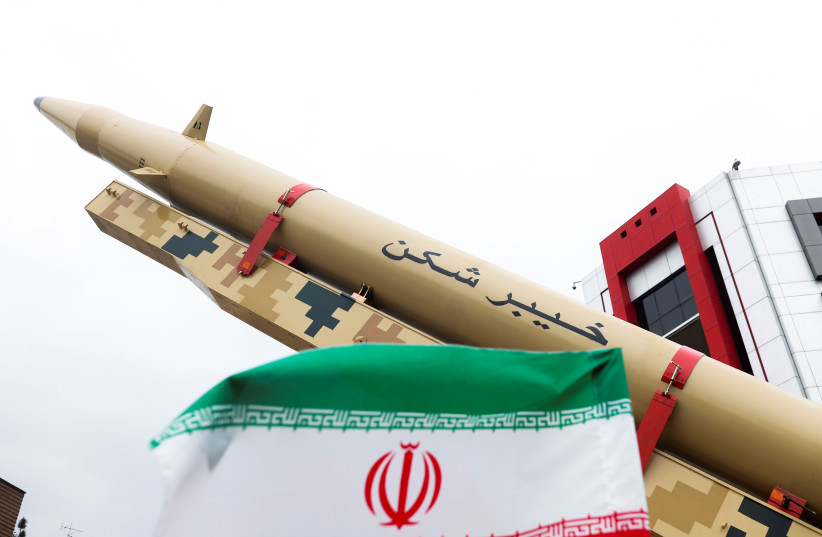Nations, like the individuals who comprise them, are periodically confronted with critical choices, moments of destiny in which they must make decisions that may define the contours of their future existence.
Throughout its short history on the world stage, the modern State of Israel has already faced more such crossroads than most, with its very being under assault from the moment it was reborn in 1948.
And now we have arrived at yet another such juncture, presenting perhaps the most perilous and pernicious dilemma in recent decades, one that must be addressed head-on without further delay.
Simply put, what is Israel going to do about Iran and its nuclear ambitions?
For years, successive leaders in Washington, Jerusalem and elsewhere have vowed repeatedly and energetically that Tehran would not be allowed to cross the nuclear threshold.
Everything from sanctions to saber-rattling has been deployed at one point or another in an attempt to dissuade the Iranian regime from forging ahead with its plans to build the bomb.
 An Iranian missile is displayed during a rally marking the annual Quds Day, or Jerusalem Day, on the last Friday of the holy month of Ramadan in Tehran, Iran April 29, 2022. (credit: MAJID ASGARIPOUR/WANA (WEST ASIA NEWS AGENCY) VIA REUTERS)
An Iranian missile is displayed during a rally marking the annual Quds Day, or Jerusalem Day, on the last Friday of the holy month of Ramadan in Tehran, Iran April 29, 2022. (credit: MAJID ASGARIPOUR/WANA (WEST ASIA NEWS AGENCY) VIA REUTERS)And while precious time has been bought as a result, it now appears that the sand in the hourglass has nearly run out.
On February 28, US Undersecretary of Defense Colin Kahl told lawmakers at a House Armed Services Committee hearing that Iran would now require just 12 days to produce enough fissile material for use in a nuclear weapon.
Then, on March 1, the Associated Press revealed that in a confidential quarterly report by the International Atomic Energy Agency (IAEA), the nuclear watchdog’s inspectors had discovered that Iran had enriched uranium to a purity of 83.7%, just shy of the 90% considered to be weapons-grade.
Previously, Iran was known to have enriched uranium to 60%, a level that all experts agreed has no civilian justification.
This rapid ramping up of the Iranian nuclear program, which was conducted with deception and deceit, leaves no doubt as to its ultimate goal.
Clearly, the tyrants of Tehran have decided to push toward the finish line in their race to join the nuclear club.
THESE RECENT developments are especially worrisome for two reasons. First, they demonstrate that Iranian scientists have the knowledge and wherewithal to produce the enriched uranium needed for a nuclear weapon.Second, they indicate that the ayatollahs are not deterred by the actions taken thus far by the Western powers, nor fearful of the potential consequences of violating the red lines laid down by them.And while the US officially continues to repeat the mantra that it will not allow Iran to build nuclear weapons, does anyone seriously think that the current administration can be relied on in this regard?
After all, when President Joe Biden entered the White House, the Iranians were enriching uranium at a level of 5%. In just two years, they have galloped to within a hair’s breadth of constructing a nuclear device.
And yet, incredibly enough, Washington still speaks of diplomacy as the way to solve this burgeoning crisis.
Indeed, just last week, on March 1, US State Department spokesman Ned Price said that “We want to see a durable, lasting resolution to the challenge posed by Iran’s nuclear program.” While cautioning that America is prepared to use “all means necessary” to achieve that goal, he went out of his way to emphasize, “We continue to believe that diplomacy is the most effective way to achieve that.”
“We continue to believe that diplomacy is the most effective way to achieve that.”
Ned Price
“We continue to believe that diplomacy is the most effective way to achieve that.”
In plain English, the Biden team is practically pleading with Tehran to please, please, pretty, pretty please, return to the negotiating table to make a deal.
Equally disturbing were the remarks made by IAEA chief Rafael Grossi, who flew to Iran earlier this week in a desperate attempt to get the Iranian regime to offer at least the appearance of concessions.
Going far beyond his mandate, Grossi assumed the position of defense attorney for Iran, telling reporters that any Israeli military strike on Iranian nuclear installations would be illegal. Speaking at a press conference in Tehran, he said, “I think any attack, any military attack on a nuclear facility is outlawed, is out of the normative structures that we all abide by.”
Needless to say, such statements give comfort to the enemy and only serve to harden the conviction among the Iranian leadership that they can pursue their nuclear objectives with impunity.
Make no mistake. We all know full well what Iran’s intentions are. For the past two decades, the would-be Hitlers of Persia have spoken openly about their desire to wipe Israel off the map. In effect, they are seeking to erect an atomic Auschwitz designed to finish what the Nazis began.
Israel cannot and must not allow this to happen.
Sure, an attack on Iran would be logistically difficult, diplomatically dangerous, and would have serious consequences. But the alternative is simply too frightening to contemplate. The alarm bells are ringing, and we can no longer kick the can down the road.
Eight decades ago, the nations of the world sat back and watched as millions of Jews were gassed and incinerated. We dare not risk that happening again. It is time for Israel to act and bomb Iran before it is too late. There is simply no other choice.
The writer served as deputy communications director under Prime Minister Benjamin Netanyahu during his first term of office.